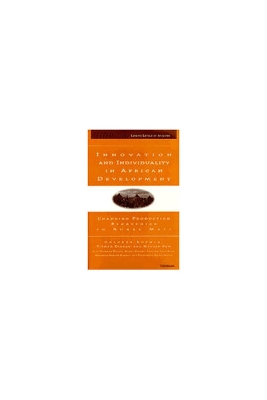Linking Levels of Analysis
2 total works
Innovation and Individuality in African Development
by Dolores Koenig and etc.
Published 31 August 1998
This book contributes to debates on how to improve development alternatives in West Africa, from the distinctive approach of anthropology--the analysis of local systems. Until now, theoretical frameworks for approaching African development have tended to overemphasize the structural factors that constrain development possibilities (including the colonial past and contemporary political-economic dependency). In Innovation and Individuality in African Development, the authors present a contemporary case study of migrant Malian farmers to illustrate how Africans have tried to improve their lives--and are often successful at doing so.
Using concepts related to human agency (negotiation, innovation, and individual choice), the authors present Africans as active people who have attempted to remake the world in which they live. Introductory chapters situate the study in Malian history and demonstrate that the determination and desire to try new things was present as well in their ancestors' nineteenth-century precolonial states.
Finally, the authors offer practical suggestions about how to improve rural development programs so that more Africans will be able to benefit from positive possibilities for social change.
This volume will speak to anthropologists, international development specialists, and those interested in contemporary Africa, offering a counterweight to much of the contemporary literature that stresses problems rather than solutions.
Dolores Koenig is Associate Professor of Anthropology, American University. Tieman Diarra is Researcher and Head, Department of Ethno-sociologie, Institut des Sciences Humaines, Mali. Moussa Sow is Secretary General, Ministry of Culture and Communication, Mali.
Using concepts related to human agency (negotiation, innovation, and individual choice), the authors present Africans as active people who have attempted to remake the world in which they live. Introductory chapters situate the study in Malian history and demonstrate that the determination and desire to try new things was present as well in their ancestors' nineteenth-century precolonial states.
Finally, the authors offer practical suggestions about how to improve rural development programs so that more Africans will be able to benefit from positive possibilities for social change.
This volume will speak to anthropologists, international development specialists, and those interested in contemporary Africa, offering a counterweight to much of the contemporary literature that stresses problems rather than solutions.
Dolores Koenig is Associate Professor of Anthropology, American University. Tieman Diarra is Researcher and Head, Department of Ethno-sociologie, Institut des Sciences Humaines, Mali. Moussa Sow is Secretary General, Ministry of Culture and Communication, Mali.
Never before in history have humans had such power over the environment as we have today, and never before have we been so close to the end of nature. With the destruction of the earth a realistic possibility, global change is the point on which theoretical discussions and practical challenges must converge.
The authors of this compelling book argue that before suitable solutions can be found to pressing environmental problems, we need a way to gather information on the human dimensions of global changes. How do small and everyday individual actions add up to the intricate networks of global interactions? What are our rights and responsibilities as humans toward the planet and its natural resources?
The Lacandon rain forest in Mexico provides a vivid example of an environmental challenge that will demand the concerted efforts of many different groups, and not only technical solutions, to resolve successfully. Using data taken largely from in-depth interviews with landowners, farm workers, cattle raisers, housewives, professionals, and civil servants, the authors draw a rich portrait of the varied perceptions and positions these groups and individuals hold. At issue are the social, rather than psychological, bases of their perspectives.
"Culture and Global Change" offers a model for how the social sciences, and anthropology in particular, can lead the way in developing comprehensive understandings of the interrelationships between groups at the local, regional, and international levels that affect perceptions of the environment and thus the viability of solutions. It is required reading for anthropologists and environmental activists alike.
Lourdes Arizpe is Assistant Director-General for Culture, UNESCO. Fernanda Paz and Margarita Velzquez work for the Centro Regional de Investigaciones Multidisciplinarias, Universidad Nacional Autonoma de Mexico.
The authors of this compelling book argue that before suitable solutions can be found to pressing environmental problems, we need a way to gather information on the human dimensions of global changes. How do small and everyday individual actions add up to the intricate networks of global interactions? What are our rights and responsibilities as humans toward the planet and its natural resources?
The Lacandon rain forest in Mexico provides a vivid example of an environmental challenge that will demand the concerted efforts of many different groups, and not only technical solutions, to resolve successfully. Using data taken largely from in-depth interviews with landowners, farm workers, cattle raisers, housewives, professionals, and civil servants, the authors draw a rich portrait of the varied perceptions and positions these groups and individuals hold. At issue are the social, rather than psychological, bases of their perspectives.
"Culture and Global Change" offers a model for how the social sciences, and anthropology in particular, can lead the way in developing comprehensive understandings of the interrelationships between groups at the local, regional, and international levels that affect perceptions of the environment and thus the viability of solutions. It is required reading for anthropologists and environmental activists alike.
Lourdes Arizpe is Assistant Director-General for Culture, UNESCO. Fernanda Paz and Margarita Velzquez work for the Centro Regional de Investigaciones Multidisciplinarias, Universidad Nacional Autonoma de Mexico.

